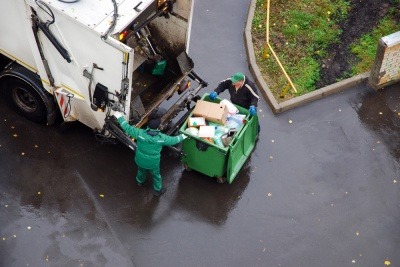OEP report calls for ‘effective delivery plan’ to update waste and resources strategy
The Office for Environmental Protection (OEP) report, published today (18 January) for Parliament, says that the UK Government needs to provide a greater focus on resource efficiency and is currently likely to miss key waste targets.
 The report, ‘Navigating the Path to Environmental Progress: A Critical Review of UK's Resource Management and Waste Reduction Efforts’ which reviews how the Government is performing against its Environmental Improvement Plan highlights significant shortfalls.
The report, ‘Navigating the Path to Environmental Progress: A Critical Review of UK's Resource Management and Waste Reduction Efforts’ which reviews how the Government is performing against its Environmental Improvement Plan highlights significant shortfalls.
It states that ‘strategic change is needed to drive the transition to a circular economy and to optimise resource use’. While noting there has been progress with respect to some waste streams, the OEP believes there is a need for a more coherent approach to connect resource use, product design, material flows and waste management.
To address this, there is a pressing need to update the 2018 Resources and Waste Strategy, to ‘develop and implement a more effective policy’ that will improve resource efficiency. While there is progress in this direction, the authors highlight that overall consumption of materials remains high and levels of residual waste have been rising over the last decade.
This means that England is ‘largely off-track’ to achieve its long-term goal of halving annual residual waste per capita to 287 kilograms (compared to 2019 levels). More immediately, the OEP states the Government is now likely to miss its interim target of reducing residual waste by 24 per cent by 2028.
In her forward, Dame Glenys Stacey, Chair of the OEP, says: ““Despite the revision of the government’s Environmental Improvement Plan, it is not clear how, or indeed whether, government will protect, restore and significantly improve the environment at the scale needed, nor how it will meet the statutory targets and interim targets it has set.”
Citing the Government’s commitment in its 25-year Environment Plan to eliminate avoidable waste and double resource productivity, the report states that ‘resources and waste are still predominantly treated in a linear fashion, from extraction to disposal, resulting in the loss of valuable materials that could be reused’.
This is labelled a missed opportunity: “Government can deliver significant change by committing to a legally binding resource efficiency target under the Environment Act 2021 and putting in place the framework to achieve a circular economy. This would deliver economic benefits and improve environmental outcomes across many areas but it requires the focus of efforts to go beyond waste.”
The report strongly emphasises the link between consumption and climate change, pointing to the fact that extraction and processing of resources accounts for around 50 per cent of all greenhouse gas emissions. Providing context, it cites Defra’s statistics that in 2020 ‘people in England used on average 13.8 tonnes of raw materials and produced 514 kg of residual waste and 95 kg of hazardous waste’.
Citing the Government’s Committee on Climate Change the report notes that ‘municipal recycling rates have seen little or not change’, making it unlikely that England will achieve the municipal recycling rate target of 65 per cent by 2035, pointing to the substantial difference in performance between England and Wales (where the latter achieved a recycling rate of 66 per cent in 2021/22).
Somewhat admonishing the current administration, the EOP observes: “Introduction of significant circular economy measures has been limited. For example, actions focused on product design to increase repairability, and substitution of hazardous chemicals to increase recycling, reuse and limit pollution, have both been minimal. Likewise, [the] government has not set targets for the collection, reuse and recycling of electronic waste, to establish a right to repair electronic waste in law or to ban the practice of intentionally shortening the lifespan of products.”
In its report last year, the OEP recognised Government efforts to tackle single-use plastics along with measures to address food waste and a response to a consultation on waste exports. However, it believes that these measures are focused on ‘specific issues and, in sum, will make only limited contributions to the residual waste long-term’.
This year’s report highlights that the Government’s current Resources and Waste strategy only runs until 2024 and cites the National Audit Office report that its plan to reduce residual waste by 25% through reforms to packaging reforms (EPR, DRS, etc) as well as changes to collection ‘do not yet exist’, though recent developments such as the Government’s plan for Simpler Recycling and its EPR consultation are developments outside the 2022/23 time frame covered in the OEP report.
In response Environment Minister, Rebecca Pow commented: "We were always clear that our targets are ambitious, and would require significant work to achieve, but we are fully committed to creating a greener country for future generations and going further and faster to deliver for nature.
"We will carefully review the Office for Environmental Protection’s findings and respond in due course."
Recommendations
The 2024 OEP report makes four recommendations to the Government to ‘maximise our resources, minimise our waste’.
1: Government should develop a coherent approach that connects resource use, product design, material flows and waste management and through the update of the Resources and Waste Strategy develop and implement more effective policy.
2: Government should review and evaluate the effectiveness of current resources and waste policies and implement actions to reverse the current stagnation moving management of waste up the waste hierarchy.
3: Government should add a target that addresses resource efficiency and the associated environmental impacts of consumption, including embodied carbon, to drive progress towards a circular economy.
4: Government should deliver greater focus on developing green choices and positive behaviours towards waste, recycling and waste crime.





